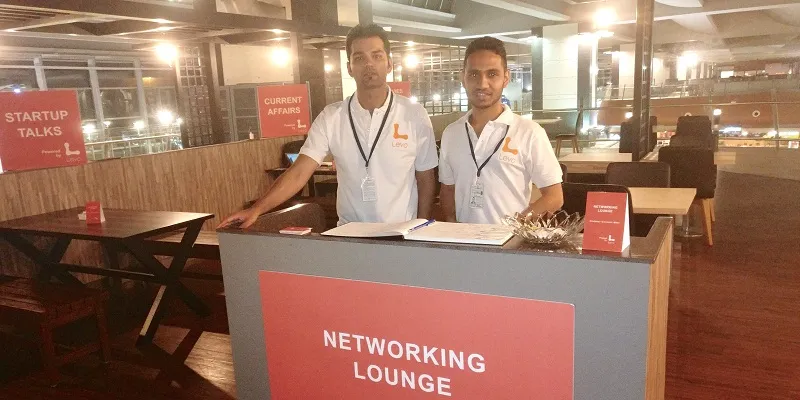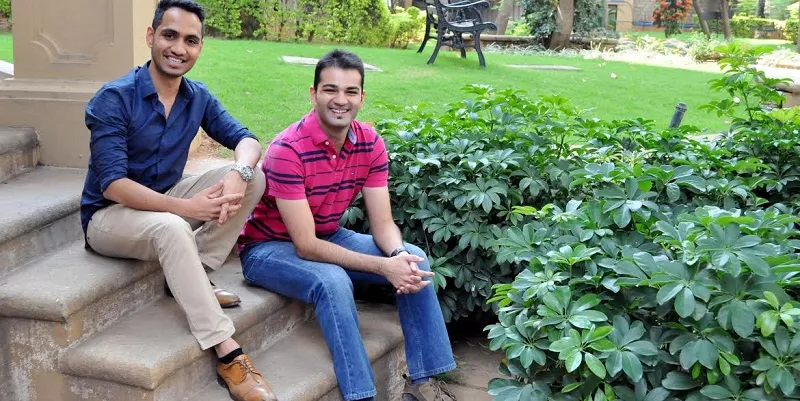Connect to Levo at airports and network for business deals in a lounge
This pair of 27-year-olds plans to make that mundane wait at the airport before flights a whole lot more interesting for business people through networking.
This summer, networking with professionals is gaining some variety. If a startup founder happens to visit Kempegowda International Airport in Bengaluru, and finds that they have a couple of hours to kill, then they are up for a treat. All that the startup founder has to do is download the Levo app. The app allows the user to put in a request for a discussion on anything, from valuations to golf to technology; the app identifies others in the airport with the user’s interest and connects them at the airport lounge powered by Levo. So while most of us may not have a Mastercard or Visa to enter a lounge, just use the smartphone to connect on the Levo network and enter the lounge powered by them to network with businessman.

According to the Airports Authority of India, airports in the country handled 223.3 million passengers last year, and they serve as a great place to network with their sprawling coffee shops and restaurants. “Most networking platforms are over social media. Nobody really meets each other. But when you use our app, you get to meet real people and figure out business interests,” says Tarun Lala, Co-founder of Levo Innovations.
Founded by 27-year-olds Rahul Maheshwari and Tarun in October 2016, the company hopes to build its network across 96 airports in India, and has plans of even taking it global eventually.
In the beginning…..
Both Tarun and Rahul finished their undergraduate and masters’ abroad in the UK and the USA. Tarun went to the US and Rahul went to both countries. They met in Bengaluru through common friends in 2015, and they began to meet regularly to discuss ideas that could become real-life businesses. “The common strand for both of us was becoming entrepreneurs, although we had worked in corporates for a year or two,” says Tarun. By 2016, they homed in on the idea of building networks for people within lounges and other social centres. And thus, the idea of Levo was born.
For the last seven months, January to July of 2016, they began building their tech with a 12-member team, and started creating a data backend system that could scale up based on the number of users that would sign up and use Levo. They are trying to become the networking tool for journeying professionals.
The company has invested Rs 8 lakh so far, and believes that most of the investment is going into time being spent in acquiring airports. Currently, they are available only in the Bengaluru airport. The user decides who to meet, and can decline meeting requests. Levo manages the match between people. Tarun says that the idea was born when he was flying. “I have been to the airport several times, and every time, I end up talking to people next to me. Most of the time, these people are an interesting bunch, and some even became friends and business associates,” he says.
According to the findings of emarketer.com, ad spend on social media will reach $35 billion by 2017. The potential avenues of revenue generation for Levo are varied; the company could target ad revenues, can tie up with lounges in airports to do a revenue share, and can also create a freemium version on its app for extended networks. Since Levo is in the business for only four months the company wants to focus on understanding user experience before figuring out ways to monetise the business.

The business
The Indian advertising industry is Rs 78,000 crore-strong, but less than 10 percent of that goes into digital ad spending, while 42 percent goes into television advertising and 38 percent into print. However, digital gives a better footprint to track the customer, and brands get a bigger impact for their investment. The problem is that there is so much data digitally that no one has sat down to understand the outcomes of targeting.
Social network businesses take a long time to make money, and will eventually need a lot of investment for marketing to acquire customers. We have witnessed this in the growth of WhatsApp and Facebook. Microsoft acquired LinkedIn for its professional network, and wants to integrate the platform with its overall business services. There are global startups like Rapportive, Happening, Weave, Lanyrd, and Meetup that are also trying to make an impact in this industry, but none of them are profitable yet. LinkedIn has the highest number of business professionals, with a 380 million user base.
“A business must know who its paying customers are, and then it must test the product out. If there are paying customers, then the business can scale up faster,” says V. Ganapathy, CEO of Axilor Ventures.
Social networks from home-grown brands are yet to make it big, and profitability is still a story that nobody wants to listen to. Among the Indian social media startups are DIKY, Brigge, and Affimity. There are more than 100 such startups in the country.
For Tarun and Rahul, the opportunity to build a business by tying up with airports is a good bet to make money and scale up. Hopefully, we will see Levo fly high in the years to come, connecting budding entrepreneurs and helping businesses flourish.







